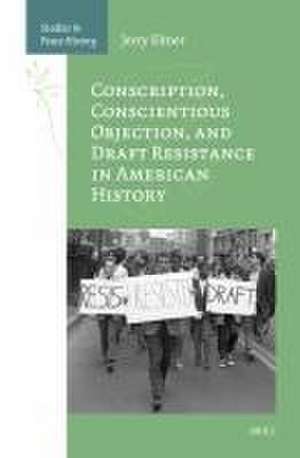Conscription, Conscientious Objection, and Draft Resistance in American History: Studies in Peace History, cartea 1
Autor Jerry Elmeren Limba Engleză Hardback – 27 sep 2023
Preț: 575.81 lei
Preț vechi: 702.21 lei
-18% Nou
Puncte Express: 864
Preț estimativ în valută:
110.18€ • 115.35$ • 91.17£
110.18€ • 115.35$ • 91.17£
Carte indisponibilă temporar
Doresc să fiu notificat când acest titlu va fi disponibil:
Se trimite...
Preluare comenzi: 021 569.72.76
Specificații
ISBN-13: 9789004515284
ISBN-10: 9004515283
Dimensiuni: 155 x 235 mm
Greutate: 0 kg
Editura: Brill
Colecția Brill
Seria Studies in Peace History
ISBN-10: 9004515283
Dimensiuni: 155 x 235 mm
Greutate: 0 kg
Editura: Brill
Colecția Brill
Seria Studies in Peace History
Notă biografică
Jerry Elmer was a Vietnam-era draft resister and a national leader in the peace movement. Later, he was the only convicted felon in his class at Harvard Law School. He has published extensively on peace movements and legal issues.
Cuprins
Acknowledgements
List of Illustrations
Abbreviations
Introduction
1 Background and Context
1 The United States Constitution
2 The Issue of Enumerated Powers
3 Civil War Conscription Antecedents
2 The Civil War: the Union
1 The Statute
2 Enrollment Refusal
3 Draft Refusal
4 Amendments to the Conscription Statute of 1863
5 Bounties
6 Conscientious Objectors
7 Legal Cases Pertaining to the Conscription Statute
8 Conclusion
3 The Civil War: the Confederacy
1 The First Confederate Conscription Statutes
2 General Responses to Confederate Conscription
3 New Conscription Statutes, December 1863–February 1864
4 Official State Exemptions
5 Armed Resistance
6 The March 1865 Statute
7 Legal Cases Pertaining to the Conscription Statute
8 Conclusion
4 World War I
1 The Statute
2 The Espionage Act of 1917 and Sedition Act of 1918
3 Registration and Opposition to It
4 The Draft and Opposition to It
5 The Slacker Raids
6 Conscientious Objection
7 Draft Prosecutions during World War I
8 Legal Cases Pertaining to the Conscription Statute
9 Conclusion
5 World War II
1 The Statute
2 The Draft in Operation
3 Conscientious Objectors
4 Civilian Public Service
5 Controversies Regarding Civilian Public Service
6 Resisters
7 The End of the World War II Draft
8 Legal Cases Pertaining to the Conscription Statute
9 Conclusion
6 The Cold War and the Korean War
1 The 1948 Congressional Debate
2 The 1948 Conscription Statute
3 The 1950 Congressional Debate and Conscription Statute
4 The Doctors’ Draft (1950) and Other Draft Laws, 1951–63
5 The Draft in Operation
6 Conscientious Objectors
7 Resisters
8 National Service Board for Religious Objectors, the Central Committee for Conscientious Objectors, and the National Council against Conscription
9 The 1948 Statute and Segregation in the Military
10 Legal Cases Pertaining to the Conscription Statute
11 Conclusion
7 The Vietnam War Era
1 Early Demonstrations and Preliminary Legal Skirmishes
2 The 1967 Conscription Statute
3 Nixon, the Lottery, and the End of the Draft
4 Evaders
5 Conscientious Objectors
6 Draft Resistance
7 The Call to Resist Illegitimate Authority and the Spock-Coffin Indictment
8 The Draft Board Raids
9 Prosecutions
10 Legal Cases Pertaining to the Conscription Statute
11 Conclusion
8 Conclusion
1 Channeling
2 Is the Draft Unconstitutional?
3 Is there a Constitutional Right to Conscientious Objection?
Select Bibliography
Index
List of Illustrations
Abbreviations
Introduction
1 Background and Context
1 The United States Constitution
2 The Issue of Enumerated Powers
3 Civil War Conscription Antecedents
2 The Civil War: the Union
1 The Statute
2 Enrollment Refusal
3 Draft Refusal
4 Amendments to the Conscription Statute of 1863
5 Bounties
6 Conscientious Objectors
7 Legal Cases Pertaining to the Conscription Statute
8 Conclusion
3 The Civil War: the Confederacy
1 The First Confederate Conscription Statutes
2 General Responses to Confederate Conscription
3 New Conscription Statutes, December 1863–February 1864
4 Official State Exemptions
5 Armed Resistance
6 The March 1865 Statute
7 Legal Cases Pertaining to the Conscription Statute
8 Conclusion
4 World War I
1 The Statute
2 The Espionage Act of 1917 and Sedition Act of 1918
3 Registration and Opposition to It
4 The Draft and Opposition to It
5 The Slacker Raids
6 Conscientious Objection
7 Draft Prosecutions during World War I
8 Legal Cases Pertaining to the Conscription Statute
9 Conclusion
5 World War II
1 The Statute
2 The Draft in Operation
3 Conscientious Objectors
4 Civilian Public Service
5 Controversies Regarding Civilian Public Service
6 Resisters
7 The End of the World War II Draft
8 Legal Cases Pertaining to the Conscription Statute
9 Conclusion
6 The Cold War and the Korean War
1 The 1948 Congressional Debate
2 The 1948 Conscription Statute
3 The 1950 Congressional Debate and Conscription Statute
4 The Doctors’ Draft (1950) and Other Draft Laws, 1951–63
5 The Draft in Operation
6 Conscientious Objectors
7 Resisters
8 National Service Board for Religious Objectors, the Central Committee for Conscientious Objectors, and the National Council against Conscription
9 The 1948 Statute and Segregation in the Military
10 Legal Cases Pertaining to the Conscription Statute
11 Conclusion
7 The Vietnam War Era
1 Early Demonstrations and Preliminary Legal Skirmishes
2 The 1967 Conscription Statute
3 Nixon, the Lottery, and the End of the Draft
4 Evaders
5 Conscientious Objectors
6 Draft Resistance
7 The Call to Resist Illegitimate Authority and the Spock-Coffin Indictment
8 The Draft Board Raids
9 Prosecutions
10 Legal Cases Pertaining to the Conscription Statute
11 Conclusion
8 Conclusion
1 Channeling
2 Is the Draft Unconstitutional?
3 Is there a Constitutional Right to Conscientious Objection?
Select Bibliography
Index
